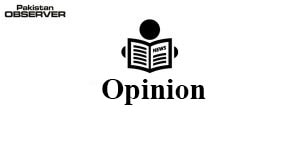Articles and letters may be edited for the purposes of clarity and space. They are published in good faith with a view to enlightening all the stakeholders. However, the contents of these writings may not necessarily match the views of the newspaper.
Kashmir Day in Pakistan
5th February is known as Kashmir Solidarity Day which is observed every year throughout the country to show support and unity for Kashmiris who are living in the India-occupied Kashmir. Pakistan has always been in the forefront of giving its moral and diplomatic support to the Kashmiris of which the most important feature was the speech at the United States General Assembly by Prime Minister Imran Khan last year.
No doubt, the lack of progress on the Kashmir dispute has poisoned the atmosphere in South Asia since the partion of the subcontinent in 1947, because it is the bone of contention between India and Pakistan and is the cause of three wars between the two.
While the United Nations’ main moto and purpose is to help establish peace and harmony in the world and protect the rights of every individual around the world but their role in Kashmir is quite minimal. No action ever taken against Indian atrocities in Kashmir.
Lastly, Pakistan should continue its efforts to resolve the issue peacefully because a military confrontation in this region would be devastating. And Indian generals and politicians should not forget that Pakistan can and will defend it befittingly.
SAMEER UMRANI
Malir Karachi
Curbs by HEC
I may please be allowed to avail the precious space of your esteemed columns to share my views relating to a serious curb imposed by HEC on external students of universities. The Commission has withdrawn the entry of students to appear in bachelors and masters degree examinations in the faculties of arts and commerce privately.
The Commission, otherwise, introduced BS and MS courses in the subjects based on semesters. This recent decision of HEC will not only enhance the financial burden of external students but will also create obstacles in carrying out studies while engaging in employment. The semester courses are relatively expensive and time consuming. Similarly, the Boards of Intermediate Education have announced Intermediate Part II results without conducting examinations and evaluated the results on the basis of marks the candidate has obtained in Part I examinations and as a result thereof, the candidates who could not get above 45% marks are not getting admission in the higher class especially universities.
If the candidates wish to continue their higher studies, they have no option but to repeat the examination and lose full academic year in this exercise. I therefore urge the HEC, Federal and Provincial governments to review abolition of Bachelor and Master Degree courses of the Universities in national interest. The authorities should also review as to how the academic year of intermediate can be saved.
Recently, the Federal government has announced some reforms in public service cadre employees serving the government. The decision to retire a government servant facing inquiry or investigation in a law enforcement agency is unjust because he was not punished by any Court of Law. Another decision to retire a government employee on the basis of consecutive adverse ACRs is also not understandable. Only a decision from the Court of Law can empower the government to impose any punishment. However, the restriction of serving in a particular province beyond ten years is a decision in the right direction.
MAHFOOZ UN NABI KHAN
Karachi
Turning into blue gold
Soon the day will come when the safe drinking water will be luxurious and only a few will get access to it. According to recent data, two-thirds of the world will be affected due to water scarcity by 2025. Not to mention, water conflicts and international disputes will arise and it will affect the stability of global peace and harmony.
On the other hand, the world’s increasing population requires more agriculture and water resources, but, sadly, the water crisis will reduce the remaining world’s natural resources. Eventually, the inflation rate will increase across the globe which will affect the mostly poor and middle class, and social unrest will emerge in many countries. People from every corner of the world will be exposed to many fatal diseases due to the drinking of polluted water.
A country like Pakistan, which is entirely dependent on agriculture, will be worst affected, economically as well as environmentally, because water shortage will make it difficult to cultivate crops. Furthermore, Pakistan is already included in water-scarce countries and it may fall into an acute water-scarce countries list by 2025 if it does not meet the water crisis challenges.
Lastly, it is time to feel the seriousness of the situation and get prepared. And measures should be taken at the national level whereby the cultivation of water-intensive crops should be reduced as it consumes excessive water. Moreover, Pakistan’s water infrastructure should be modified because it wastes thousands of gallons of water every year due to its poor condition. More and more water reservoirs should be built up to avoid water waste and saved for a hard time.
ABDUL MUSAWIR HAKRO
Ghotki, Sindh
Corruption in Pakistan
The world’s leading ranking agency for corruption Transparency International has released its latest report for the last year. The report includes 180 countries in the world for corruption and it is unbelievable that Pakistan is ranked 124th in 2020 as in 2019 ranked 120th and in 2018 it was ranked 117th in corruption index.
In Pakistan, corruption rate is increasing every year instead of decreasing. Even according to NAB (National Accountability Bureau) during 2 years they recovered two billions from the corrupt ones. Everyone was sanguine that NAB will be contributing to low the index of Pakistan in word’s corruption Transparency International, but NAB has bitterly failed to control corruption.
M JAAN QADIR
Turbat










